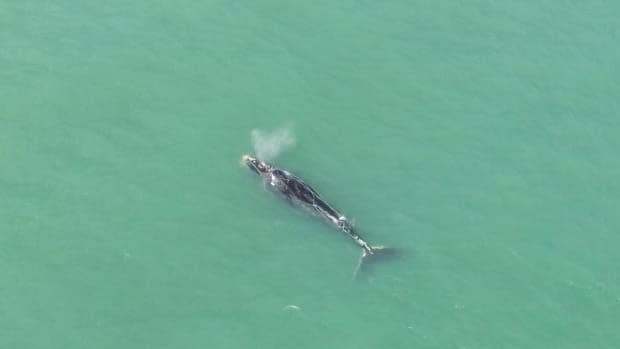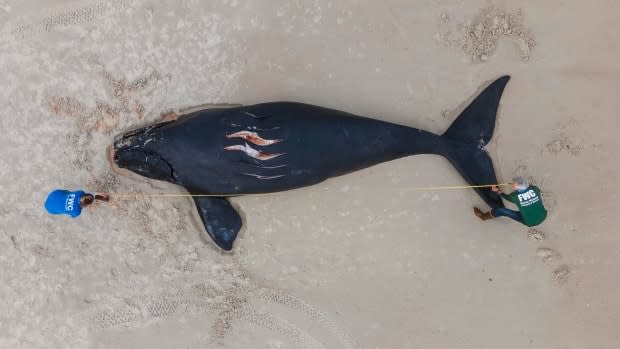Marine group calls for stricter fishing gear rules after right whale death

A marine organization says stricter rules governing fishing gear are needed following the death of a North Atlantic right whale that was found dead off the coast of South Carolina on Saturday with fishing rope hanging out of its mouth.
Amy Knowlton, a senior scientist at the New England Aquarium's Anderson Cabot Center for Ocean Life, said Cottontail was first spotted last October during an aerial survey. At the time, he had fishing rope over his head and trailing from out of his mouth.
The 11-year-old whale was sighted again on Feb. 18 off the coast of Florida, still entangled in the ropes and looking "severely emaciated," Knowlton said.
He was tagged with a satellite tracker during the sighting, however, the signal was lost shortly thereafter, Knowlton said.
"Then the whale was found dead 10 days after that sighting on Feb. 28 off of Myrtle Beach, S.C., so a long, slow bad death for this poor whale," she said.
Evidence speaks for itself
Knowlton said there won't be any further examination of Cottontail's corpse to find out exactly how it died.
However, given the fact the whale had been entangled for so long, and had lost so much weight, the culprit is very likely the fishing rope, Knowlton said.

"We've documented this multiple times in right whales that the entanglement, which was through the mouth, probably prevented this whale from feeding. And he had deep lacerations from the gear," she said.
"And the loss of body weight just confirms that he likely wasn't able to feed."
Cottontail is the latest recorded death of a North Atlantic right whale caused by human activity.

The endangered species, of which there are just about 366, migrates annually to waters such as the Bay of Fundy and the Gulf of St. Lawrence to feed and mate before migrating to areas off the shores of Florida and Georgia to give birth to their young in the winter months.
Since 2010, however, the population of the species has dwindled, with fishing rope entanglements and vessel strikes being the primary cause, Knowlton said.
"We need to change how things are happening on the ocean to help the species turn that downward trajectory around," she said.
"They've been declining in numbers since 2010 and we know that much of that decline is due to entanglements."
Possible changes may not be enough
The U.S. National Oceanic and Atmospheric Administration has proposed new rules to the Atlantic Large Whale Take Reduction Plan, which was implemented in 1997 with the goal of reducing the occurrence of serious injury and death of North Atlantic right, humpback and fin whales.
The proposed changes include:
Modifying gear marking to introduce state-specific colours and increase the number of gear markings and areas requiring marked lines.
Modifying gear configurations to reduce the number of vertical lines by requiring more traps between buoy lines.
Introducing weak insertions or weak rope into buoy lines.
Modifying existing seasonal restricted areas to allow ropeless fishing.
Adding one or two new seasonal restricted areas that are closed to buoy lines but allow ropeless fishing.
Knowlton said the proposal should go further in requiring fishing rope be made to break at an even lower stress point so that whales don't get entangled as easily.
The ultimate goal, however, should be the elimination of roped fishing gear, she said.
"So it's a big change for the industry, but it's definitely needed to help not just right whales, but other large whale species that are dying as a result of entanglement," she said.
Allison Ferreira, a spokesperson for the National Oceanic and Atmospheric Administration, said the organization hopes to have the new regulations in place this summer.
She said no one was available to comment on potentially introducing even stricter rules.

 Yahoo Movies
Yahoo Movies 